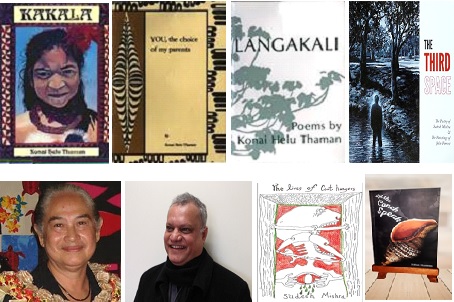If music is sound organised in a particular way through instruments, poetry is a way of organising language and literature made special to be remembered and valued.
Unlike other literary forms that we can date to precise texts and time periods, it’s a challenge to pinpoint the earliest work of poetry.
In one form or another, poetry has been around for thousands of years.
Over the centuries, countless poems have been written, (in thousands) documented and forgotten, but there is a proven fact about some that will always be remembered, read over and over, again and again.
It is a vast subject as old as history can remember.
This article re-visits the works of our Pacific poets whose work not only shapes the views of the Pacific and the Oceania but as well as the whole world.
By engaging, interacting, interpreting and capturing the livelihoods of the Pacific people, these champions of literature craft the mixture of art and words so deeply telling stories and thoughts of the Pacific people and their culture.
Their form of poetry shines a light of richness and variation of Pacific’s poem with the elusive quality that makes it more enticing. It is a vital read hugely enjoyed.
Prof Kona Helu Thaman has published five collections of poetry: You, the Choice of My Parents (1974); Langakali (1981); Hingano (1987); Kakala (1993); and Songs of Love: New and Selected Poems (1999). Prof Thaman’s work is studied by schoolchildren throughout the Pacific region and globally and has published in the context of Pacific focus.
Many of her poems have been translated into several languages including Chinese, French, and German.
Prof Sudesh Mishra is the head of School of Literature, Language, Arts and Media at USP and has held key positions in creative writing.
His works in poetry include Rahu (1987); Tandava (1992); Memoirs of a Reluctant Traveller (1994), Diaspora and the Difficult Art of Dying (2002); Third Space (2014); The Lives of Coat Hangers (2016).
His poetry’s are more philosophical and contemporary deriving how meaning is manifested in the modern world.
Bhagwanji Bhindi is a senior lecturer at the Fiji National University is the author of “Ocean of Shadows” (2013).
His poems reflect myriads of life experiences which he encountered and endeavoured which he portrays in his words.
His poems reflect his thoughts, philosophies and feelings over a long time and in this collection of poems, he attempts to convey these thoughts and sentiments on various subjects and issues of life. Simply, he defines life through the art of poetry.
In 14 degrees south, regional writer, John Enright sings the lyrical song of Samoa in a way that is impossible to match anyone and in anytime in the history of those islands.
His book is the winner of the USP Press Prize poetry of 2011. It is a distillation of his poetic output whilst his living on the islands.
He captures the island life simplicity and mystery in a tall rank of Pacific literature for those seeking “Island soul”.
The words of Prof Epeli Hau’ofa — “We are the Ocean” gave a voice to the Pacific people as life force of the region.
The Pacific has a unique identity, resources and cultures and these words inspire the regional writers.
After the establishment of the University of the South Pacific in 1968, there was a stream of poetry books authored by Pacific Islanders with the most recent one by our own director of the Oceania Centre for Arts and Pacific Studies, Dr Frances Koya titled, “Fragments”.
Her works explore contemporary issues through spoken words that reconnect and reclaim the elements of indigenous oratory and poetry.
The wave of some other Pacific poets includes;
n Albert Wendt — Some Modern Poetry from Solomon Islands;
n Sano Malifa — Looking Down At Waves;
n Peter Sipeli — Lialiaca; and
n Neelam Singh — Moments.
In her poetry book, “Let the Conch Speak” Dr Nikhat Shameem recounts her long journey and travels interwoven with other stories that impact her life under different circumstances.
With just with few words but so much meaning, Dr Shameem coveys her life-long journey — (Jane Ricketts).
This is just what poetry is about – language chosen and arranged through emotions and experiences to give a meaning in sound and rhythm.
n The views expressed are those of the author and does not reflect the views of the University of The South Pacific or The Fiji Times. Many of these poetry books are available at USP Bookcentre. Contact maharaj_v@usp.ac.fj.



